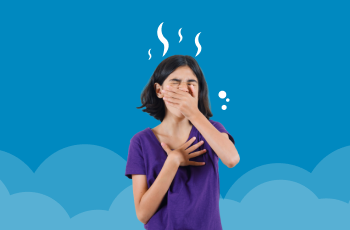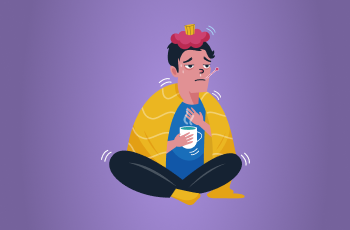What is the difference between a cough and a chest infection?
Written by Dr Nelson Lau MBBS FRACGP, General Practitioner and Digital Health Specialist
Knowing the difference between a cough and chest infection can sometimes be challenging, however it’s important to recognise that these are two conditions with different treatment approaches. In this article, I’ll discuss how each of them can be effectively treated, and when it’s necessary to seeking medical attention.
A Cough
A cough is an action that occurs when our respiratory tract needs to eliminate irritants like smoke, dust or mucous. It is a response mechanism that helps keep our airways clean and clear. Various factors can trigger coughs, including infections like the cold or flu, allergies, environmental irritants, asthma or acid from gastro-oesophageal reflux disease (GORD).
Most coughs are not worrisome and can be managed with over-the-counter medications like cough suppressants or expectorants. However, if a cough becomes persistent for more than two weeks or is accompanied by symptoms such as a high fever, purulent (contains pus) mucous, wheezing or shortness of breath, it’s advisable to seek medical attention.
A Chest Infection
On the hand, a chest infection is a serious condition that occurs when bacteria or viruses (such as influenza or COVID-19) infect the lungs or airways. This can lead to symptoms such as a cough, chest pain, fever and trouble breathing, resulting in bronchitis or pneumonia.
While antibiotics can adequately treat many chest infections, not all chest infections warrant antibiotics. Treatment of mild or viral chest infections with antibiotics will result in antibiotic resistance over time, meaning that if you get sick again in future, the antibiotic may no longer be as effective. However, it’s crucial to seek help if symptoms persist or worsen over time as an untreated chest infection may lead to serious complications such as a septic shock, lung abscesses pleural effusions (build-up of fluid around the lungs), and respiratory failure. The type of antibiotics used as first line treatments are often from the penicillin family of antibiotics, such as Amoxicillin, however this can vary greatly depending on patient factors, allergies, other past medical conditions and allergies
When Should You Consult Your Doctor?
If you experience any of the following symptoms, seeking medical attention is essential:
- A cough that lasts for than 2 weeks.
- Chest pain or tightness.
- Fever that lingers for days.
- Difficulty breathing or experiencing shortness of breath.
- Coughing up blood or mucous.
- Wheezing, or hearing a whistling sound while breathing.
- Sensation of tightness or discomfort in the chest area.
- Difficulty swallowing or experiencing heartburn.
If you’re dealing with a cough or a chest infection, it’s important to consult a doctor to determine a diagnosis and receive appropriate treatment. They can assist you in managing your symptoms and devising a plan to enhance your well-being.
Options For Treating Coughs and Chest Infections
Coughs:
The treatment approach for a cough or chest infection depends on the cause. In the case of a mild cough, treatment may involve- rest
- staying hydrated
- and using over–the–counter medications to alleviate symptoms – cough expectorants are used for productive coughs with phlegm, whereas cough suppressants are used for dry coughs
Chest infections:
For chest infections where the condition is more serious, antibiotics may be prescribed by your doctor to combat the infection. If the cough is related to a condition such as asthma, then specific inhaler medications may be prescribed. Aside from medication there are actions you can take to help alleviate your symptoms and promote respiratory health- Adequate fluid intake aids in thinning mucous making it easier to expel through coughing.
- Using a humidifier can add moisture to the air and provide relief from congestion.
- Moreover, getting rest enables your body to recover from the infection efficiently.
Prevention
Taking steps to prevent the spread of infections, as we have all experienced with the COVID-19 pandemic, is crucial for maintaining health. Here are some tips that can assist in preventing infection transmission:
- Wear a mask when you have a persistent cough and associated symptoms.
- Frequent handwashing after coughing or sneezing.
- Avoiding contact with individuals who are unwell.
- Refraining from sharing utensils or personal items with individuals who are ill.
- Covering your mouth and nose with a tissue when coughing or sneezing.
- It’s advisable to stay at home if you’re feeling unwell, whether it’s due to a cough or a chest infection.
It’s important to understand the distinction between a cough and a chest infection and seek medical assistance if your symptoms persist or worsen over time. A consult with doctor can help determine the cause of your cough and develop a plan to improve your condition and prevent any complications.

Related Articles
Natural home remedies for Dry Cough: Doctor’s Pick
March 14, 2024Coughs
Natural home remedies for Dry Cough: Doctor’s Pick Written by Dr Nelson Lau – MBBS...
- 1
- 2
Disclaimer
This content is created for informational purposes only. It is not intended to be a substitute for professional medical advice. Always seek the guidance of your doctor or other qualified health professional with any questions you may have regarding your health or a medical condition. For emergencies please immediately contact 000.











 Facebook
Facebook Instagram
Instagram LinkedIn
LinkedIn


